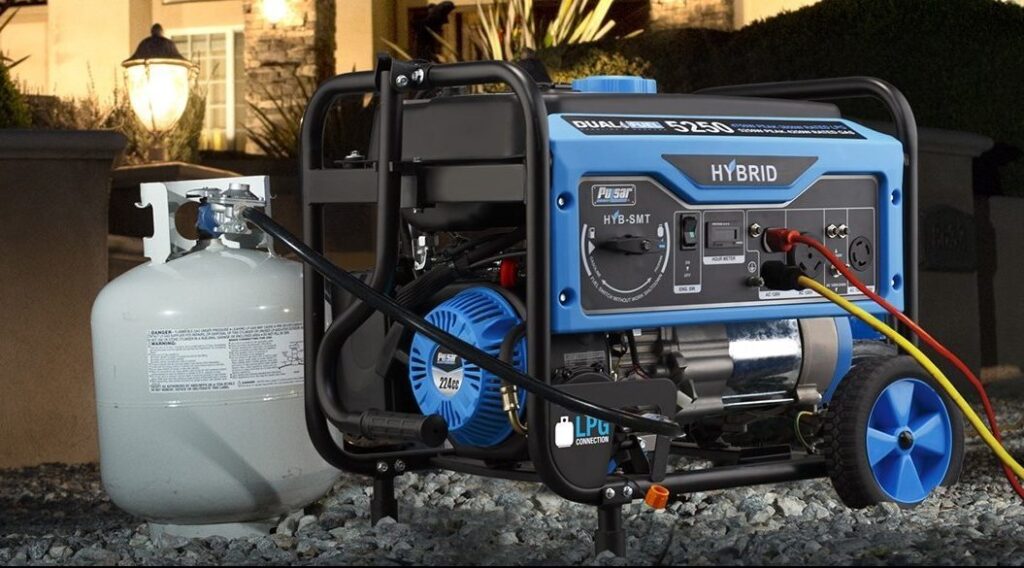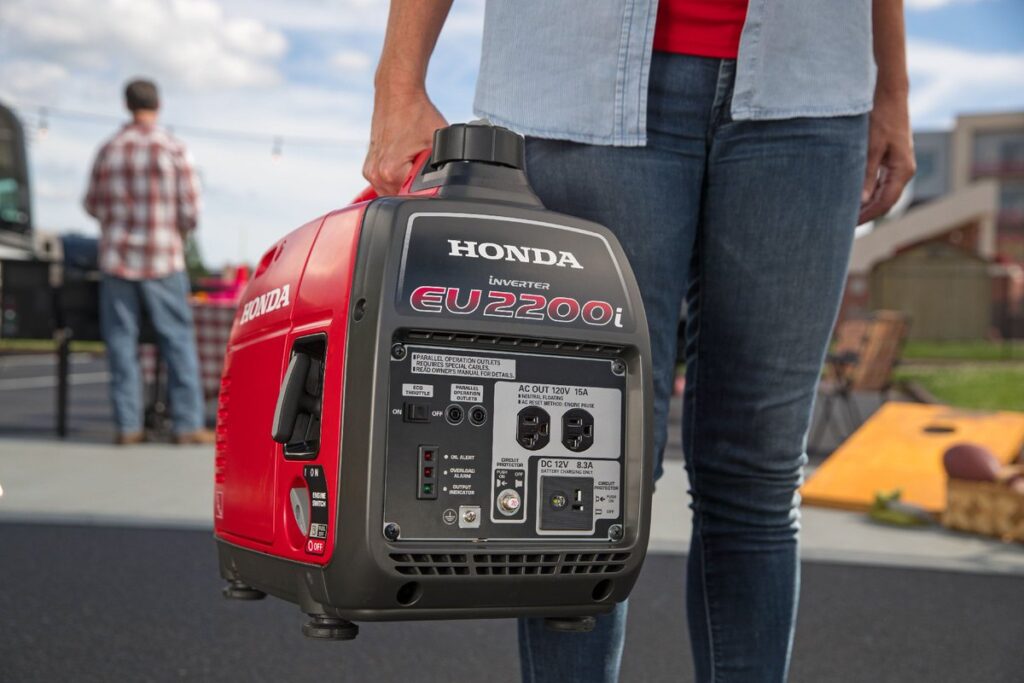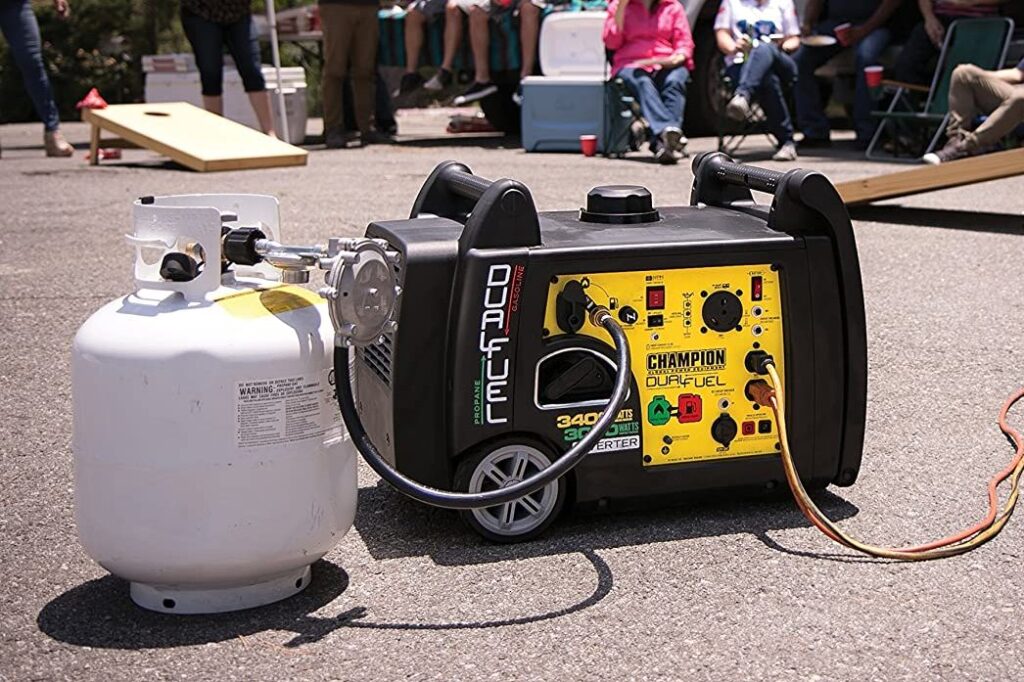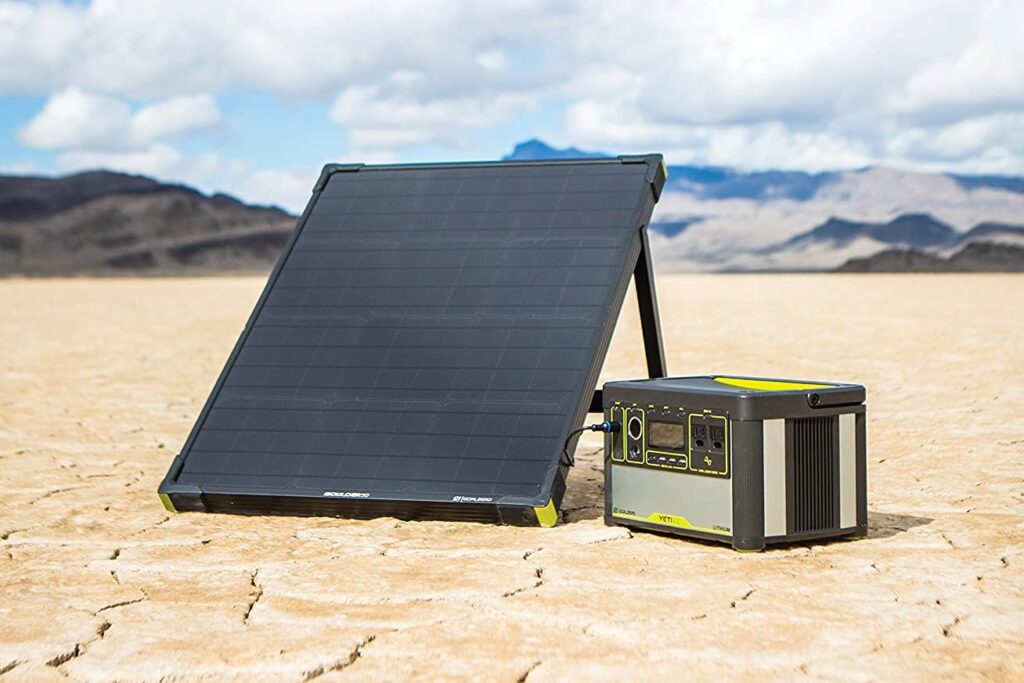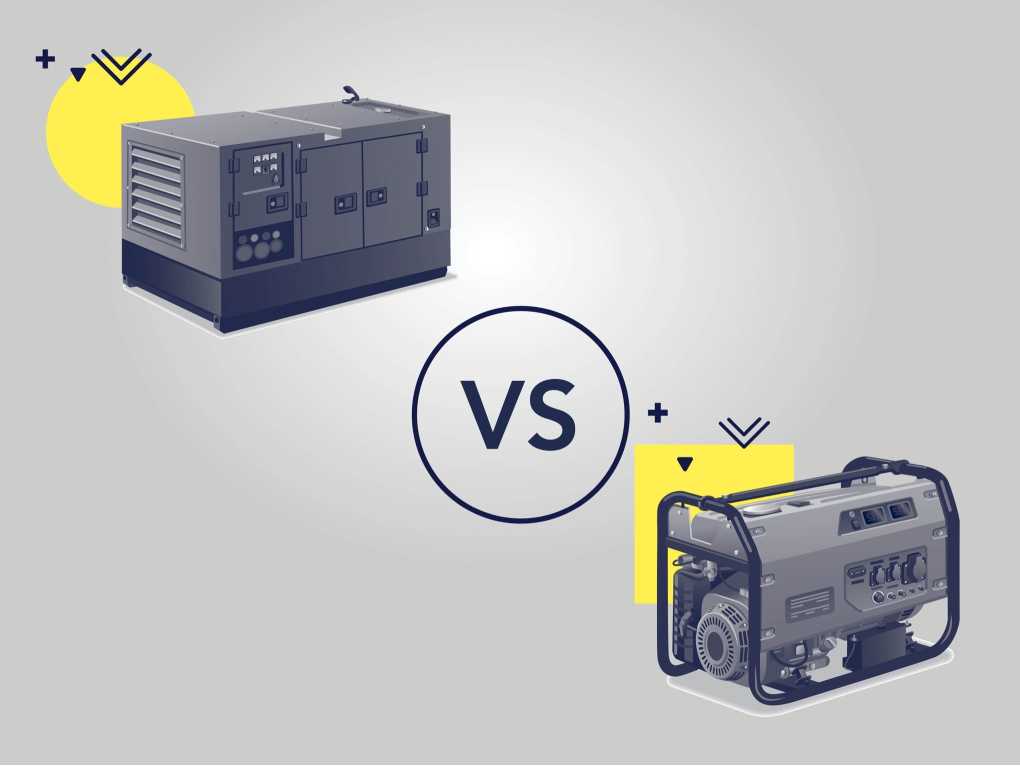If you’re heading out to see the country and enjoy the outdoors in an RV, you’re going to need a power source to keep all the appliances that make your RV feel like home running smoothly. The best RV generator needs to be able to power everything inside your vehicle on demand while simultaneously being quiet and fuel efficient – essentially giving you the best bang for your buck every time you use it.
In order to pick out the best RV generators, we considered a number of different features that set the top contenders apart from the pack. We first looked at the type of fuel that the generator uses – gasoline, propane, or either – since this affects how much it will cost to run the generator and how easy it will be to carry fuel. We also looked at the wattage the generator provides, which will determine how many large appliances you can power at once. Additional considerations, such as the starting mechanism and the availability of RV outlets, also factored into our picks.
We spent tens of hours reviewing technical specifications and customer feedback for the most popular RV generators on the market today to come up with the eight best RV generators, which are highlighted in the table below. Continue reading for detailed reviews of each generator, complete with pros and cons. Our buying guide covers everything you need to know about the features that define a generator and how to choose the model that’s right for you. Finally, we announce our overall top three picks for the best RV generator.
Users rave about this beast of a generator from Champion, which is also one of the most versatile generators we reviewed thanks to its ability to run on either gasoline or propane. The 224cc engine has an electric starter built in, which users appreciated over having to pull on a traditional cord starter. At only 59 dB, this generator is actually quieter than the much smaller Honda generator. At the same time, the larger engine is able to put out an impressive 3,800 watts of continuous power when running on gasoline and 3,420 watts when running on propane, which users found was enough to power their homes during emergencies above and beyond simply powering everything you could want to run inside your RV. Note that Champion also offers more powerful generators suitable for RVs, and you can find them in our Champion dual fuel generator reviews.
The downside to this generator for many RV users is the size. Although the generator is on wheels, it weighs more than 95 pounds and takes up a significant amount of space. The 3.4-gallon fuel tank also adds weight when full, not to mention that the generator guzzles fuel – it runs only nine hours at half load on gasoline, or 10.5 hours on a standard propane tank.
One of the things that users liked most about this generator, beyond the high wattage, was the outlet panel. In addition to a 30A RV outlet, the generator has two standard 20A outlets for electronics not connected to your RV’s electrical circuit and a second 30A twist-lock outlet. All of the outlets are protected by Volt Guard to prevent power surges that could damage your electronics. Plus, there is an LED panel showing how much power is being drawn from the generator at any time, making it easy to gauge whether one additional appliance will overload the motor. Another advantage – Champion offers a three-year warranty with lifetime technical support.
With a medium-sized 121cc engine, this small and portable gasoline-powered generator from Honda is a great choice for RV owners who don’t want to commit to a heavy-duty wheeled generator but want more power than a small 80cc generator can provide. The generator weighs just 46.5 pounds, making it the lightest generator we reviewed, and has a grab handle on top to aid in carrying it around. The generator is also relatively quiet at 62 dB, which is an advantage if you’re operating it in a smaller RV that echoes noise.
Users rave about the commercial series Honda engine, which provides an outsized amount of power for this generator – it is rated to 1,800 watts of continuous power or 2,200 watts of surge power. RV owners found this was plenty to power a refrigerator and freezer and an air conditioning unit all at once as long as the RV’s battery charging was turned off. Plus, although the fuel tank uses less than a gallon of gas, it can run at six hours at half load – meaning that you won’t spend a fortune on gas to operate this generator and you won’t need to carry more than a five-gallon jug with you in the RV. The only feature that users didn’t love on this generator was the recoil pull start as opposed to an electric push-start, although they found that the recoil start was relatively responsive.
The generator is somewhat light on outlets, with just one 20A outlet. However, RV operators who want this primarily to power their RV’s electrical grid will be happy with the 30A twist-lock RV outlet.
The generator has a low oil warning light to prevent you from damaging the engine. Plus, Honda offers a long, three-year warranty on this generator to protect your investment.
The iGen4500 is Westinghouse’s offering for RV owners who don’t feel the need to power their generator off of propane and who are looking for an ultra-quiet alternative to other large generators. Despite the 224cc, four-stroke engine – which is capable of putting out an impressive 3,700 watts of continuous power and 4,500 watts of surge power – the generator makes just 52 dB of noise. That’s on par with the noise produced by the WEN generator, which produces less than half the wattage! That said, the generator still guzzles fuel to produce all that power, running through its 3.4-gallon tank in just 18 hours even when running at one-quarter load. The generator also lacks the eco mode found on other generators.
Users loved the electric start on this generator, and even more so the ability to remotely start this generator from inside the RV. The generator is quite large and weighs 98 pounds, although the body-mounted wheels make this unit less bulky than similar wheeled generators for storage inside the RV. It also has a suitcase-style handle for wheeling it along, which users appreciated.
The outlet panel on this RV is similar to that on the WGen3600DF, with a 30A RV outlet and two 20A all-purpose outlets. However, a significant advantage of this generator is the LED panel displaying the wattage being pulled from the generator so you can monitor your usage and see the remaining runtime based on your fuel usage. The outlet panel also has lights to warn you if the oil is low or if you are approaching overload, as well as a trickle charging port for charging the battery in your RV.
Westinghouse covers this generator with a three-year warranty. In addition, users rave about the company’s customer service team whenever minor issues do arise, which are infrequent.
This gasoline-powered inverter generator from Champion is perfect for users who love the company’s 76533 model, but need a smaller package and don’t want to pay extra for the high-end features of that generator. This generator is smaller and shaves off about 15 pounds despite featuring the same 224cc Champion OHV engine. The weight and size savings are in part because this version of the engine is not able to run on propane. However, it still puts out an impressive 3,500 watts of continuous power and 4,000 watts of surge power. Note, however, that this generator is still quite heavy at 81 pounds and is not mounted on wheels, so users warn that you’ll want to have two people to move it around safely. In addition, it features a pull-cord start rather than the electric push-start beloved by users on other generators.
Compared to the 76533, this generator is slightly noisier at 64 dB – although users note that this is still impressively quiet compared to competitors given the power output of this generator. Like the dual fuel model, this generator has a relatively short runtime of only 17 hours at one-quarter power, although it is noticeably more fuel efficient since the fuel tank capacity has been reduced to 2.9 gallons. There is also an eco mode switch to reduce your fuel consumption when not using the full power of the generator.
The outlet panel lacks the LED screen for monitoring power output, but includes a 30A RV outlet as well as two 20A three-pronged outlets. The generator also includes a 12V DC outlet for channeling power through an inverter or using your car chargers to power your small electronics.
Champion ensures that this generator will last as long as your RV or longer by offering a three-year warranty as well as lifetime technical support.
This dual fuel generator from Westinghouse boasts a large 212cc four-stroke engine that efficiently churns out power. The generator is capable of supporting 3,600 watts of continuous power when running on gasoline or 3,240 watts when running on propane. Compared to the Champion 76533 generator, which boasts similar continuous and surge power ratings, it is slightly larger and heavier at 109 pounds. However, the extra weight is not critical, since the generator is mounted on wheels and this generator features both electric and remote starts – the latter feature something that users loved for turning on the electricity in the morning after a night camping out in the RV.
The generator is relatively noisy, producing 69 dB, as well as gas-hungry – it’s four-gallon fuel tank is exhausted in just 18 hours at one-quarter power. This means that you’ll want to plan on carrying a 10-gallon or larger fuel can when planning to be away from gas stations for extended periods with this generator. Users did appreciate how easy it is to switch this generator to propane without turning off the engine, though, so it may be worth carrying a propane canister despite the lower power output.
The outlet panel includes a 30A RV outlet to make connecting your vehicle to the generator easy. It also includes two 20A outlets and a second 30A twist-lock outlet to provide you the flexibility to connect all of your electronics.
Westinghouse covers their generator with a three-year warranty. In addition, users consistently complimented the company’s customer service, noting that they readily sent replacement parts for small breakages that occurred by the fault of users. Users also report back after years of using this generator to say that it continues to work as well as when they first purchased it.
This inexpensive gasoline-powered generator is perfect for owners of small RVs on a budget. At a fraction of the cost of the generator from Honda, this 80cc four-stroke motor is able to put out nearly the same wattage – 1,600 watts of continuous power and 2,000 watts of surge power. Users were happy with the pull-start on this generator for the price given that it starts on the first pull nearly every time. Plus, this is the quietest generator we reviewed at only 51 dB, making it a great choice if you’ll be in a crowded campground where generator noise is restricted in the evenings.
The generator is also lightweight at only 48 pounds and the carry handle on the top makes it easy to carry in and out of an RV. Users do note that the dimensions of the generator make it somewhat tall, which can be an issue for fitting it in small spaces within your RV when not in use. They also wished for a larger gas tank – the one-gallon tank leaves only enough fuel to power the generator for six hours at half load, so it frequently needs to be shut down, cooled off, and refueled, which can mean a lot of periods without power.
RV users will also want to be aware that there is no 30A RV outlet on the panel of this generator, so you will need to purchase an adapter if you plan to connect your RV’s circuitry to this unit. This can also be problematic since there are only two 20A outlets, and the adapter may limit you to using one of them by blocking the other. However, the panel does include a USB charging port and a 12V DC outlet for additional power needs.
WEN provides a two-year warranty on this generator, which users appreciated given the low cost of the unit.
This small generator from Generac is highly portable while packing plenty of watts to keep a small RV powered. The 80cc engine may seem puny compared to the 224cc engines found on the larger generators we reviewed, but this generator is still able to put out 1,700 watts of continuous power and up to 2,200 watts of surge power. Users note that this is a good alternative to the Honda generator since it puts out nearly the same wattage while being priced at less than half the cost of the Honda model. The generator also weighs only 46 pounds, which makes it easy for one person to carry over moderate distances or to load in and out of the RV.
Plus, compared to larger gas-guzzling RV generators, this generator will save you money with by dramatically reducing your fuel consumption. Users do note, however, that the fuel tank on this generator could afford to be larger – it only holds 1.2 gallons, allowing the generator to run for just under 11 hours at one-quarter load (approximately one appliance). Users also wished for an electronic start rather than the manual pull-cord start, although they noted that it often starts on the first pull.
The electrical panel features two 20A three-pronged outlets, a 12V DC outlet for using your car chargers, and a dual USB charging port. However, RV users will want to take note that there is no 30A RV outlet on this generator, so you’ll need to use an adapter that may limit the types of appliances that you can power to those that can run off 20A outlets.
Generac offers a two-year warranty on this generator and users note that it works well over a period of years of moderate use.
This heavy-duty 224cc gasoline generator from Pulsar boasts a wide array of features that make it a great choice for RV owners. First, the generator provides all the power you could need to run all of the appliances in your RV at the same time – 3,500 watts of continuous power and 4,000 watts of surge power. Users loved the electronic push-start and the ability to start the generator from up to 80 feet away with the remote start. In addition, a major advantage of this generator over its competitors is the large 3.4-gallon fuel tank, which allows the generator to run for a whopping 15 hours at half load. While the generator is not particularly quiet at 63 dB, users note that it can also make a whine when running at higher loads that adds significantly to the noise.
The generator is heavy at nearly 93 pounds and can be quite bulky within small- to medium-sized RVs, but Pulsar did make some adaptations to help with portability. The generator has plastic wheels mounted on the rear and has an extendable suitcase-style handle to make it easy to pull around. However, the grab bar on the top can be uncomfortable to hold and users note you’ll want two people around to load it in and out of your RV.
The outlet panel includes a 30A RV outlet to make it easy to connect this generator to your vehicle’s electrical circuitry. The generator also has two standard 20A outlets, a 12V outlet for using your car chargers, and a USB charging port for your small electronics.
Despite the size, power, and moderate price of this generator, Pulsar only supplies a one-year warranty. However, users report that it works without issues over longer periods of use.
Now that you’ve learned more about our eight favorite RV generators on the market today, how do you choose between them to find the generator that is right for your vehicle and the trips you expect to take? Our buying guide will cover everything you need to know about the features that define how a generator will perform for your vehicle and answer some of the questions that people new to RVs typically ask when looking to add a generator to their vehicle.

The engine is the heart of your generator – the essential component that allows fuel to be converted into electricity. In general, a larger, more powerful motor will have a higher wattage rating, and particularly a higher surge wattage rating, so that you can run more appliances and electronics at the same time.
A larger engine also means a larger and heavier generator, so there is a trade-off between power and portability.
This is one of the main reasons that generators can be separated into those boasting 224cc motors, like the Pulsar, Westinghouse, and Champion generators, and those with much small 80cc motors, like the WEN and Generac generators.
When considering the engine size you need, think about how many appliances you have installed in your RV and how many of them you will need to power at one time. In addition, consider how much space your RV has – if you are relatively limited, it may be worth opting for a smaller generator so you have more space to actually enjoy your RV.
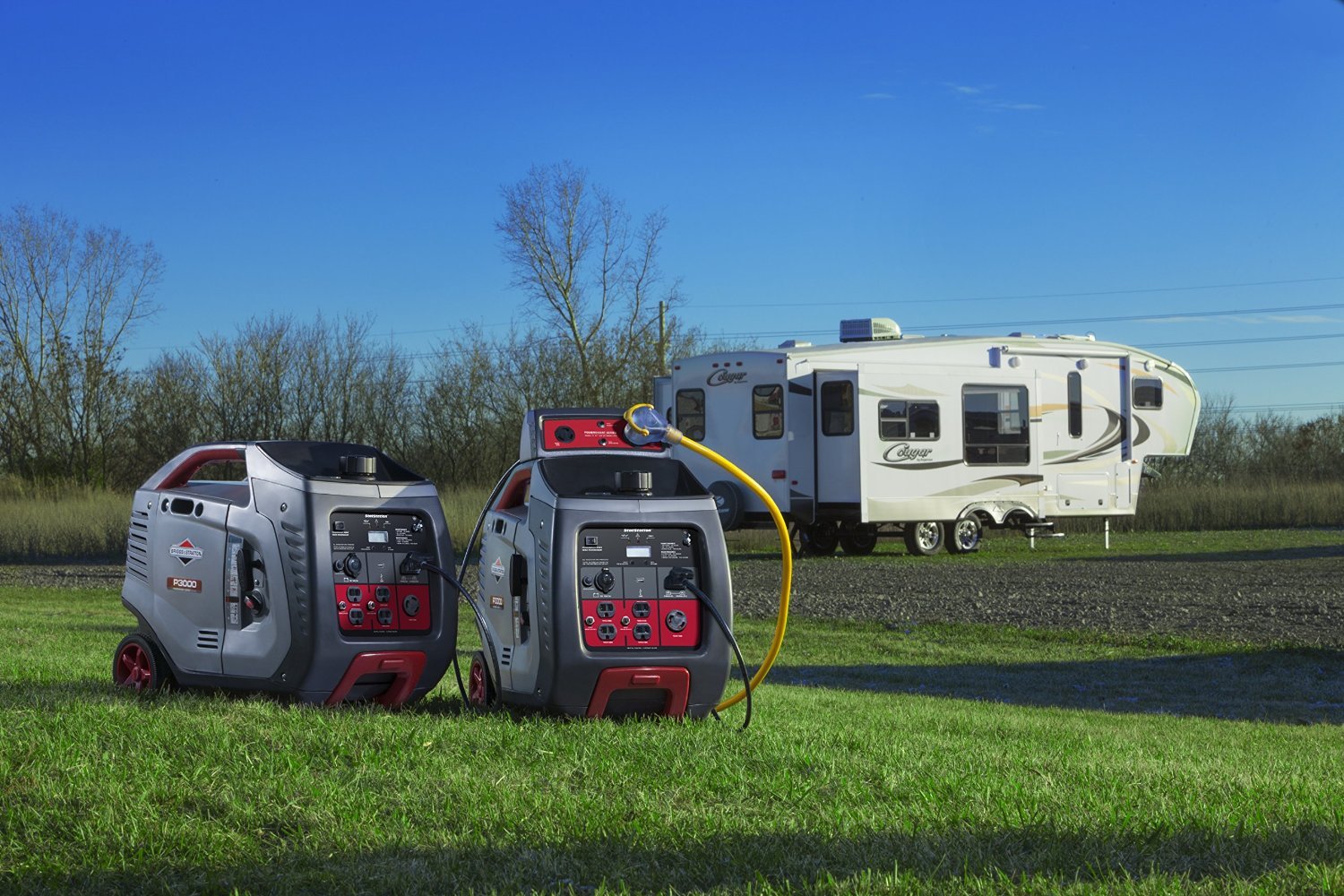
When you’re on the road in populated places, both fuel sources are typically easy to find, although you can procure gasoline at the same time you are refueling the RV itself. However, farther afield where gas stations are few and far between, using gasoline can become problematic since it is harder to carry in large quantities than propane and will go stale if you plan on being off the grid for more than a few weeks.
Gasoline is also typically much more expensive than propane and the price can vary much more from state to state depending on local taxes.
On the other hand, gasoline is a much more efficient fuel than propane, especially when the temperature drops. Most generators that are able to run using either gasoline or propane actually have two wattage ratings – one for running on gasoline, and a lower rating when the generator is running on propane.
Once you’ve settled on the type of fuel you’re planning to use, the next big decision you need to make is how much wattage you need from your generator. The rated output is likely different for gasoline and propane for dual fuel generators, so be sure to take this into account. To find the wattage you need, a simple solution is to add up the required watts of all the appliances you plan to run at a single time – this number will define the rated wattage that you need from your generator. In general, leave yourself some leeway on this number since you are better off having slightly too much available power from your generator than too little, especially if your family members want to charge their small electronics at the same time that your appliances are running.
Any appliances that have motors, such as air conditioning units, refrigerators, and freezers, will have an additional power draw when they are first started. This is where the maximum output wattage, also known as surge wattage, comes into play. Your generator will only be able to support this maximum power for a few seconds, long enough to start these appliances without stalling as the power requirement surges.
If you have left yourself leeway when calculating your running power requirement, your generator will likely provide enough surge power to get all your appliances started as well.
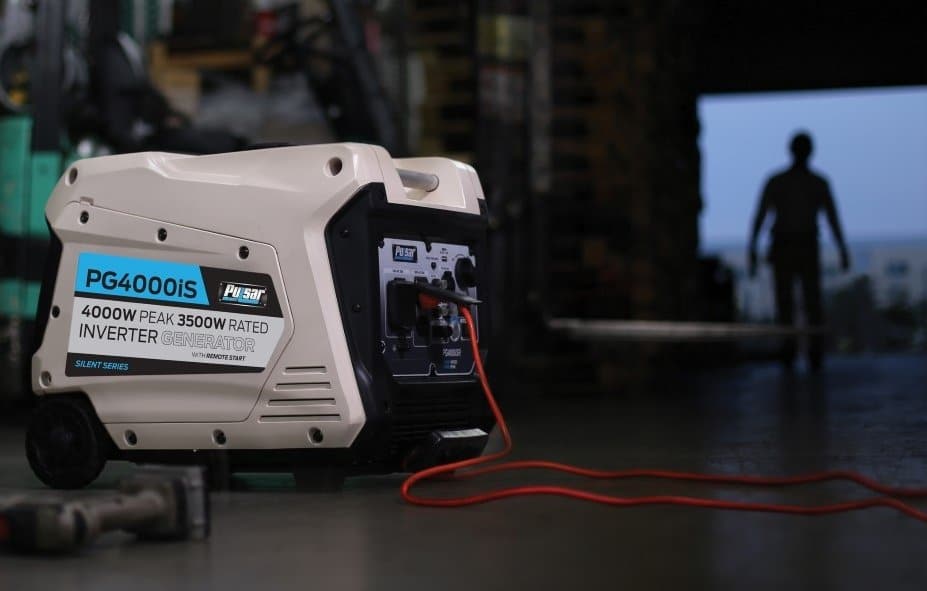
You can also look directly at the rated runtimes of different generators to get an idea of how long they will run on a single fuel tank fill. Runtimes are typically measured at half-load or quarter-load, meaning that only half or one-quarter of the generator’s available running output is being used – remember that running the generator near capacity will drastically reduce your fuel economy and your runtime.
You probably got in your RV to get away from the city, including all of its noise – so you don’t want a generator that is going to drown out the sounds of the outdoors. RV generators are typically rated for the amount of noise that they produce. This figure can range widely from the ultra-quiet WEN generator, which makes only 51 dB of sound, to the relatively noisy 69 dB Westinghouse WGen3600DF. However, note that larger engines – thus, generators with higher output wattages – will typically be noisier than their smaller counterparts so you have to consider noise as another trade-off for power.
Having the outlets you need on your generator can be just as important as having enough wattage. Most of the generators we reviewed come with a 120-volt, 30-amp RV outlet so you can plug your vehicle’s electrical infrastructure directly into the generator. However, note that on the smaller generators from WEN and Generac, you’ll need to plug your appliances directly into the generator, since there is no RV outlet.
Once your generator is loaded onto your RV, its weight and portability may not seem like a huge concern. However, if you plan on taking your generator out of the vehicle to refuel it, or to pull it out into your campsite to run electronics outside of the vehicle, weight can be a major factor in your decision. The weight of RV generators is typically directly related to the size of the engine – as a result, you’ll need to decide where you wish to fall on the trade-off between output wattage and portability. Small, 80cc generators like those from WEN and Generac weigh less than 50 pounds, while the more powerful generators we reviewed can weigh as much as 109 pounds in the case of the Westinghouse WGen3600DF.
Note that some of these heavier generators are also mounted on wheels, which can improve their portability but makes them significantly harder to store inside your RV because of the space they take up.
Adding a generator to your RV can be a significant investment, so you want to be sure that the generator you choose will be able to stand up to years of use. One of the best ways to ensure this is to choose a model with a long warranty from the manufacturer. Warranties on RV generators range from the relatively short one-year policy offered by Pulsar to the impressive three-year warranties that come with the Honda, Champion, or Westinghouse generators.
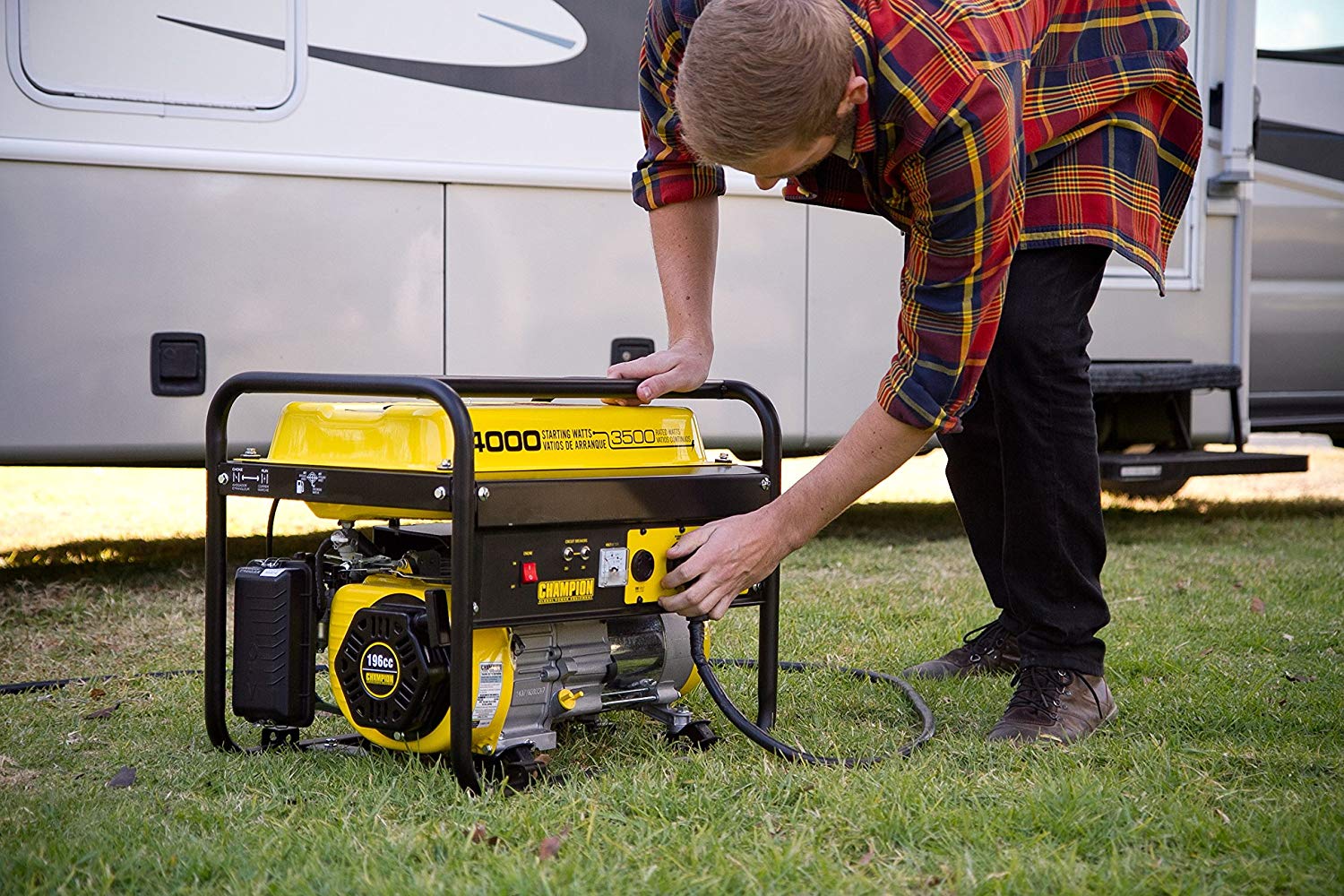
When starting your generator, make sure that you adjust the choke – if it is not automatic – according to the amount of airflow that the generator needs. If you are operating the generator at altitude, you may need to open the choke more than normal. In addition, it is important to always operate your generator in a well-ventilated space or outside. It is good practice to have a carbon monoxide monitor installed in your RV just in case of any leaks.
When operating the generator, make sure that you don’t exceed its capacity. Turn on any motor-operated appliances, like a refrigerator or freezer, first since these will have surge requirements when powering on. If you are using an air conditioner, make sure it is turned off before you start or stop the generator to avoid a dangerous power surge that could burn out your motor. Always check the wattage requirements of your appliances so that you know how much power you are drawing and be careful not to exceed the rated output of your generator.
Our three overall favorite RV generators on the market today are the Champion 76533, the Honda EU2200IC, and the Westinghouse iGen4500. The Champion and Westinghouse generators are built with hefty 224cc motors to provide upwards of 3,400 continuous watts when running on gasoline. Meanwhile, the Honda generator uses a smaller 121cc engine to provide greater portability, which makes it a great choice for people with smaller RVs. The Westinghouse generator stands apart for its unique suitcase-style wheeling design, while users loved the LED panels for monitoring power draw on both the Champion and Westinghouse generators. We feel that the Champion 76533 is the overall best RV generator you can get for the money, since it can run on propane as well as gasoline and provides an impressive amount of power without making much noise in the process, and all for a relatively moderate price.
